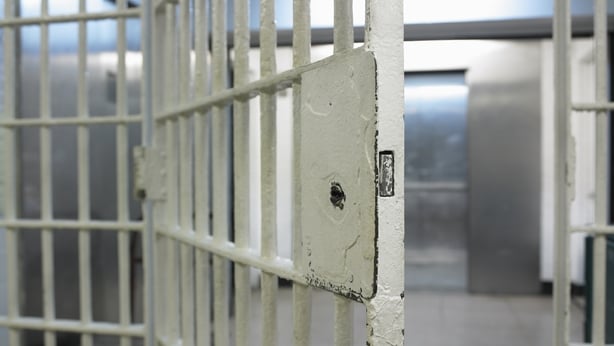Investigations are under way to identify a substance taken by a number of prisoners at Portlaoise Prison.
The Irish Prison Service said six prisoners have returned to prison after being discharged from hospital.
Three others were taken to intensive care, two of whom have also been discharged. One prisoner remains in ICU but is being described as responding to treatment.
Two other prisoners also remain in hospital and are in a stable condition.
It is understood that tests are looking to determine whether the drug taken was a synthetic opioid or stimulant.
Results are expected later.

The Irish Prison Service said extra security measures were being put in place as a result of the incident.
It comes three weeks after the IPS issued an urgent drug alert across all prisons following detection of nitazine, which can result in a fatal overdose.
The IPS has said it is working closely with the Health Service Executive and it has secured extra naloxone kits in the event of clinical intervention.
This is a prescription medication used to temporarily reverse the effects of opioid drugs.
In a statement, the IPS said it is "committed to preventing the access of contraband including drugs into prisons and continues to be a high priority for the Irish Prison Service".
The IPS said prison staff have increased the use of random and intelligence led cell searches on a daily basis and the Canine Unit carries out searches around the prisons, including searching deliveries into prisons.
We need your consent to load this rte-player contentWe use rte-player to manage extra content that can set cookies on your device and collect data about your activity. Please review their details and accept them to load the content.Manage Preferences
It said: "The Irish Prison Service continues to engage with An Garda Síochána with regard to preventing contraband entering our prison and this happens at both local and national level. The Operational Support Group work closely with their colleagues in An Garda Síochána on a regular basis and the sharing of intelligence has led to target searches resulting in the seizure of contraband."
The IPS has also said it is working closely with the Health Service Executive and it has secured extra naloxone kits in the event of clinical intervention.
This is a prescription medication used to temporarily reverse the effects of opioid drugs.
'Very signifcant' incidents of nitazene overdoses
The Garda National Drug and Organised Crime Bureau said there has been a number of "very significant" incidents of nitazene overdoses since last November.
Detective Chief Superintendent Séamus Boland said it is "a concern" and that it is "a trend we were aware that was taking place across Europe, among organised crime groups that has not gone away".
He said it is "an unfortunate trend that we're going to have to deal with" and that "it's a trend as well that people who are using drugs are going to have to be conscious [of]".
He added: "These are the dangers for people who are using control drugs. Transnational organised crime will do their best to ensure that they can maximize, that they can increase their customer base, and they can increase their profits."
Detective Chief Superintendent Boland said "certain mitigating factors" were in place by the Department of Health.
"The response that the State had in place in advance of even the first outbreak of overdoses has actually saved many lives," he said.
He said the issues in Portlaoise Prison "feed back into the dangers of the synthetic opioids that are actually available and have been available have been causing similar problems, all across Ireland since late last November".
He added: "I make that comment in advance of knowing what is the exact cause of that, but I think an informed opinion would say that it's probably going to turn out to be something like a synthetic opioid.
"An Garda Síochána is working, has been working and continues to work very close with the Irish Prison Service in relation to that matter and all other matters."
What happened at Portlaoise was 'inevitable' - POA General Secretary
Karl Dalton, General Secretary of the Prison Officers' Association, has said what happened at Portlaoise Prison was inevitable in what is a "chronic, overcrowded prison".
Speaking on RTÉ News at One, he said the prison has not got spare beds and is overcrowded at a 90% level, not including the fact that single cells now have bunk beds in them.
"All of this leads to unrest, pressure on services, which inevitably has always led to drug misuse within the prisons," he said.
When asked about the extent of the drug use issue at Portlaoise, Mr Dalton said it is "as big a problem as anywhere else in the State".

"Every prison has chronic problems with drugs. The prison service has failed to put meaningful measures in place to prevent drugs coming into the prison."
While accepting that you cannot keep all drugs out of a prison, Mr Dalton said some things that can be done have not been done.
He highlighted the ongoing issue of the firebombing of nets around prisons, saying POA and Irish Prison Service officials visited a prison in Northern Ireland to observe nets which are of a metal design.
"That was August of last year we were looking at those nets, so they have not been implemented anywhere," he said.
In a statement, POA Deputy General Secretary Gabriel Keaveny said the Minister for Justice and the prison authorities "need to see this incident in Portlaoise as an inevitable consequence of inaction over the years".
"The chronic issues impacting on our prison system must be addressed or we will be confronted with significant crisis events in the very near future."
Prison overcrowding making drug problem worse, says IPRT
Overcrowding is contributing to the drugs problem in prisons, the Irish Penal Reform Trust has said.
Executive Director of the Irish Penal Reform Trust Saoirse Brady said overcrowding in prisons is contributing to the drugs problem.
Speaking on RTÉ's Morning Ireland, she said that on Tuesday capacity was 5,017 across all prisons - which equals 112% capacity - and in Portlaoise this was 107% on Tuesday.
Ms Brady said a lot of prisoners in the system have an existing addiction and part of the problem is that they do not always get the support they need while in prison.
"There is a health-led approach in the community to substance misuse, and the emphasis should be on that within the prison estate as well, taking into account the security considerations that are there.
"Drug use in prison does happen and a zero tolerance approach doesn't always work," she said.
Additional reporting Fergal O'Brien







